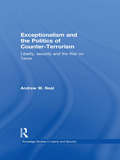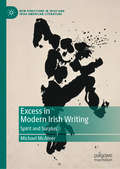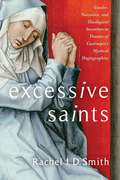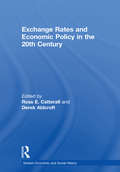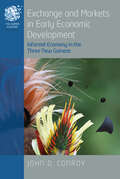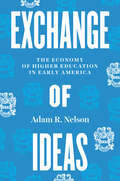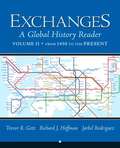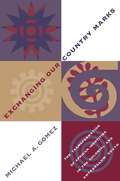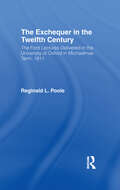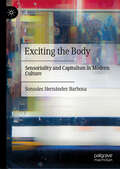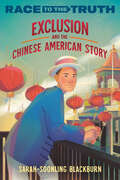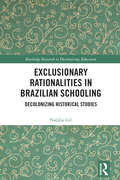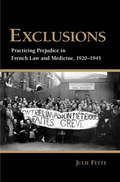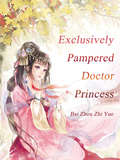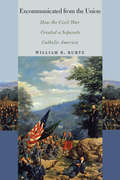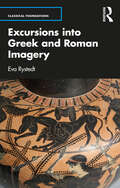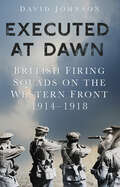- Table View
- List View
Exceptionalism and the Politics of Counter-Terrorism: Liberty, Security and the War on Terror (Routledge Studies in Liberty and Security)
by Andrew W. NealThis book is an analysis and critique of the concepts of ‘exception’ and ‘exceptionalism’ in the context of the politics of liberty and security in the so-called ‘War on Terror’. Since the destruction of the World Trade Centre on September 11th 2001, a notable transformation has occurred in political discourse and practice. Politicians and commentators have frequently made the argument that the rules of the game have changed, that this is a new kind of war, and that exceptional times require exceptional measures. Under this discourse of exceptionalism, an array of measures have been put into practice, such as detention without trial, ‘extraordinary rendition’, derogations from human rights law, sanction or connivance in torture, the curtailment of civil liberties, and aggressive war against international law. Situating exceptionalism within the post-9/11 controversy about the relationship between liberty and security, this book argues that the problem of exceptionalism emerges from the limits and paradoxes of liberal democracy itself. It is a commentary and critique of both contemporary practices of exceptionalism and the critical debate that has formed in response. Through a detailed assessment of the key theoretical contributions to the debate, this book develops exceptionalism as a critical tool. It also engages with the problem of exceptionalism as a discursive claim, as a strategy, as a concept, as a theoretical problem and as a practice. This is the first book to capture the importance of the exceptionalism debate in a single volume, and will be of much interest to students of critical security studies, political philosophy, IR theory and sociology.
Excess in Modern Irish Writing: Spirit and Surplus (New Directions in Irish and Irish American Literature)
by Michael McAteerThis book examines the topic of excess in modern Irish writing in terms of mysticism, materialism, myth and language. The study engages ideas of excess as they appear in works by major thinkers from Hegel, Kierkegaard and Marx through to Nietzsche, Bataille, Derrida and, more recently, Badiou. Poems, plays and fiction by a wide range of Irish authors are considered. These include works by Oscar Wilde, W. B. Yeats, G. B. Shaw, Patrick Pearse, James Joyce, Sean O’Casey, Louis MacNeice, Samuel Beckett, Elizabeth Bowen, Roddy Doyle, Seamus Heaney, Marina Carr and Medbh McGuckian. The readings presented illustrate how Matthew Arnold’s nineteenth-century idea of the excessive character of the Celt is itself exceeded within the modernity of twentieth-century Irish writing.
Excessive Saints: Gender, Narrative, and Theological Invention in Thomas of Cantimpré’s Mystical Hagiographies (Gender, Theory, and Religion)
by Rachel J. SmithFor thirteenth-century preacher, exorcist, and hagiographer Thomas of Cantimpré, the Southern Low Countries were a harbinger of the New Jerusalem. The Holy Spirit, he believed, was manifesting itself in the lives of lay and religious people alike. Thomas avidly sought out these new kinds of saints, writing accounts of their lives so that these models of sanctity might astound, teach, and trouble the convictions of his day.In Excessive Saints, Rachel J. D. Smith combines historical, literary, and theological approaches to offer a new interpretation of Thomas’s hagiographies, showing how they employ vivid narrative portrayals of typically female bodies to perform theological work in a rhetorically specific way. Written in an era of great religious experimentation, Thomas’s texts think with and through the bodies of particular figures: the narrative of the holy person’s life becomes a site of theological invention in a variety of registers, particularly the devotional, the mystical, and the dogmatic. Smith examines how these texts represent the lives and bodies of holy women to render them desirable objects of devotion for readers and how Thomas passionately narrates these lives even as he works through his uncertainties about the opportunities and dangers that these emerging forms of holiness present. Excessive Saints is the first book to consider Thomas’s narrative craft in relation to his theological projects, offering new visions for the study of theology, medieval Christianity, and medieval women’s history.
Exchange Rates and Economic Policy in the 20th Century (Modern Economic and Social History #Vol. 13)
by Derek H. AldcroftThe themes of this study are the exchange rate regimes chosen by policy makers in the twentieth century, the means used to maintain these regimes, and the impact of these decisions on individual national economies and the world economy in general. The book draws heavily on new research showing the lessons and the legacy left for policy makers by the gold standard and the attempt at its resurrection in the 1920s. In examining issues such as the gold exchange standard, the gold bullion standard, the experience of floating exchange rates, the Bretton Woods arrangements, the EMS and the ERM, and the Currency Board approach, there is a conscious attempt to draw out the relevance of history for policy makers now.
Exchange and Markets in Early Economic Development: Informal Economy in the Three New Guineas (The Human Economy #10)
by John D. ConroyThe idea of an informal economy emerged from, and is a critique of, the ideology of ‘economic development’. It originated from Keith Hart’s recognition of informal economic activity in 1960s Ghana. In the context of four colonialisms – German, British, Australian and Dutch – this book recounts Hart’s effort in 1972 to introduce the informal ‘sector’ into development planning in Papua New Guinea. This was problematic, because ‘the market’ was scarcely institutionalized, and traditional modes of exchange persisted stubbornly. Rather than conforming with post-colonial economic ideology, the subjected people pushed back against imposed bureaucracy to practice informal and hybrid modes of economic activity.
Exchange of Ideas: The Economy of Higher Education in Early America
by Adam R. NelsonThe first volume of an ambitious new economic history of American higher education. Exchange of Ideas launches a breathtakingly ambitious new economic history of American higher education. In this volume, Adam R. Nelson focuses on the early republic, explaining how knowledge itself became a commodity, as useful ideas became salable goods and American colleges were drawn into transatlantic commercial relations. American scholars might once have imagined that higher education could sit beyond the sphere of market activity—that intellectual exchange could transcend vulgar consumerism—but already by the end of the eighteenth century, they saw how ideas could be factored into the nation’s balance of trade. Moreover, they concluded that it was the function of colleges to oversee the complex process whereby knowledge could be priced and purchased. The history of capitalism and the history of higher education, Nelson reveals, are intimately intertwined—which raises a host of important and strikingly urgent questions. How do we understand knowledge and education as commercial goods? Who should pay for them? And, fundamentally, what is the optimal system of higher education in a capitalist democracy?
Exchanges in Exoticism
by Megan MooreCharting important new territory within medieval gender studies, Megan Moore explores the vital role that women played in transmitting knowledge and empire within Mediterranean cross-cultural marriages. Whereas cross-cultural exchange has typically been understood through the lens of male-centered translation work, this study, which is grounded in the relations between the west and Byzantium, examines cross-cultural marriage as a medium of literary and cultural exchange, one in which women's work was equally important as men's. Moore's readings of Old French and Medieval Greek texts reveal the extent to which women challenged the cultures into which they married and shaped their new courtly environments. Through the lens of medieval gender and postcolonial theory, Exchanges in Exoticism demonstrates how the process of cultural exchange - and empire building - extends well beyond our traditional assumptions about gender roles in the medieval Mediterranean.
Exchanges: A Global History Reader Volume II from 1450
by Trevor R. Getz Richard J. Hoffman Jarbel Rodriguez S.F.S.U.This impressive collection of readings illustrates that the history of the world is as much about the relationships among societies as it is about transformations and continuities within societies. Exchanges: A Global History Reader is designed as an introduction to the discipline of world history. Unlike other source collections, Exchanges helps students look beyond strictly delineated regionalism and chronological structures to understand history as a product of ongoing debate. Structured around a series of interconnected themes and debates, and pairing both primary and secondary sources, Exchanges challenges both students and teachers to rethink history.
Exchanging Our Country Marks
by Michael A. GomezThe transatlantic slave trade brought individuals from diverse African regions and cultures to a common destiny in the American South. In this comprehensive study, Michael Gomez establishes tangible links between the African American community and its African origins and traces the process by which African populations exchanged their distinct ethnic identities for onedefined primarily by the conception of race. He examines transformations in the politics, social structures, and religions of slave populations through 1830, by which time the contours of a new African American identity had begun to emerge.After discussing specific ethnic groups in Africa, Gomez follows their movement to North America, where they tended to be amassed in recognizable concentrations within individual colonies (and, later, states). For this reason, he argues, it is possible to identify particular ethnic cultural influences and ensuing social formations that heretofore have been considered unrecoverable. Using sources pertaining to the African continentas well as runaway slave advertisements, ex-slave narratives, and folklore, Gomez reveals concrete and specific links between particular African populations and their North American progeny, thereby shedding new light on subsequent African American social formation.
Exchequer in the 12th Century: The Ford Lectures Delivered In The University Of Oxford, In Michaelmas Term, 1911 (classic Reprint)
by R. L. PooleFirst Published in 1973. Routledge is an imprint of Taylor & Francis, an informa company.
Exciting the Body: Sensoriality and Capitalism in Modern Culture
by Sonsoles Hernández BarbosaThis book uncovers how during the origins of modernity in the nineteenth century the senses were mobilised to sell more, both through the popularisation of objects aimed at the senses (such as panoramas, optical boxes, automatons, music boxes and pianolas), and also through marketing mechanisms (for example, advertising and window dressing). All these novel objects and spaces had one thing in common: the aim of attracting the public by stimulating the senses. By examining practices that mobilised the senses in the emerging fields of advertising, marketing and the leisure industry, and through an approach that involves elements from the history of the senses, visual studies, sound studies and aesthetics, this book explores what this new sensory-driven mass culture was all about. The basis of English translation of this book, originally in Spanish Vidas excitadas. Sensorialidad y capitalismo en la cultura moderna (2022), was facilitated by artificial intelligence. The author, with the support of Lucille Banham, has subsequently revised the text further in an endeavour to refine the work stylistically.
Exclusion and the Chinese American Story (Race to the Truth)
by Sarah-SoonLing BlackburnUntil now, you've only heard one side of the story, but Chinese American history extends far beyond the railroads. Here's the true story of America, from the Chinese American perspective.A Junior Library Guild Gold Standard SelectionIf you've learned about the history of Chinese people in America, it was probably about their work on the railroads in the 1800s. But more likely, you may not have learned about it at all. This may make it feel like Chinese immigration is a newer part of this country, but some scholars believe the first immigrant arrived from China 499 CE--one thousand years before Columbus did! When immigration picked up in the mid-1800s, efforts to ban immigrants from China began swiftly. But hope, strength, and community allowed the Chinese population in America to flourish. From the gold rush and railroads to entrepreneurs, animators, and movie stars, this is the true story of the Chinese American experience.
Exclusionary Empire: English Liberty Overseas, 1600-1900
by Jack P. GreeneConsisting of an introduction and ten chapters, Exclusionary Empire examines the transfer of English traditions of liberty and the rule of law overseas from 1600 to 1900. Each chapter is written by a noted specialist and focuses on a particular area of the settler empire - Colonial North America, the West Indies, Ireland, the early United States, Canada, Australia, New Zealand, and South Africa - and on one non-settler colony, India. The book examines the ways in which the polities in each of these areas incorporated these traditions, paying particular attention to the extent to which these traditions were confined to the independent white male segments of society and denied to most others. This collection will be invaluable to all those interested in the history of colonialism, European expansion, the development of empire, the role of cultural inheritance in those histories, and the confinement of access to that inheritance to people of European descent.
Exclusionary Rationalities in Brazilian Schooling: Decolonizing Historical Studies (Routledge Research in Decolonizing Education)
by Natália GilThrough in-depth socio-historical analysis of discourses and processes of quantification around school performance and student failure rates in Brazil, this volume highlights the prevalence of Eurocentric colonized thought that results in the persistence of exclusion bottlenecks, different trajectories according to gender, race and class, significant regional variations in the rates of failure and dropout, among other problems. Focussing on processes performed between 1918 and 2012, chapters offer rich analysis of historiographic sources including journals, newspapers, and administrative documentation to trace the development of initiatives intended to promote the democratization of Brazilian schooling. Examination of reforms including school classification, the graduated school model, admissions examinations, and automatic promotion reveal a school system which mirrors wider societal injustices and guarantees academic success for only a minority of students. Bringing a nuanced and elaborated historical perspective of the pragmatics of the selective classificatory logic in different institutional and epistemic qualities of the school organization of children and reasoning about abilities and achievement, it will appeal to scholars and researchers with interests in curriculum and assessment, the sociology of education, and the history of education.
Exclusions: Practicing Prejudice in French Law and Medicine, 1920-1945
by Julie FetteIn the 1930s, the French Third Republic banned naturalized citizens from careers in law and medicine for up to ten years after they had obtained French nationality. In 1940, the Vichy regime permanently expelled all lawyers and doctors born of foreign fathers and imposed a 2 percent quota on Jews in both professions. On the basis of extensive archival research, Julie Fette shows in Exclusions that doctors and lawyers themselves, despite their claims to embody republican virtues, persuaded the French state to enact this exclusionary legislation. At the crossroads of knowledge and power, lawyers and doctors had long been dominant forces in French society: they ran hospitals and courts, doubled as university professors, held posts in parliament and government, and administered justice and public health for the nation. Their social and political influence was crucial in spreading xenophobic attitudes and rendering them more socially acceptable in France.Fette traces the origins of this professional protectionism to the late nineteenth century, when the democratization of higher education sparked efforts by doctors and lawyers to close ranks against women and the lower classes in addition to foreigners. The legislatively imposed delays on the right to practice law and medicine remained in force until the 1970s, and only in 1997 did French lawyers and doctors formally recognize their complicity in the anti-Semitic policies of the Vichy regime. Fette's book is a powerful contribution to the argument that French public opinion favored exclusionary measures in the last years of the Third Republic and during the Holocaust.
Exclusively Pampered Doctor Princess: Volume 1 (Volume 1 #1)
by Bai ZhouZhiYueShe had been framed by her stepmother in her previous life, drugged by her sisters, and had been involved with a strange man in the night. As a result, her father had driven her out of the house and killed her own mother. After her rebirth, she brought a small group to rebuild the Godly Doctor Pavilion, and that small group found a father for her. Little blob: Mother, I like this daddy so much, you did it, right?
Exclusively Pampered Doctor Princess: Volume 2 (Volume 2 #2)
by Bai ZhouZhiYueShe had been framed by her stepmother in her previous life, drugged by her sisters, and had been involved with a strange man in the night. As a result, her father had driven her out of the house and killed her own mother. After her rebirth, she brought a small group to rebuild the Godly Doctor Pavilion, and that small group found a father for her. Little blob: Mother, I like this daddy so much, you did it, right?
Exclusively Pampered Doctor Princess: Volume 3 (Volume 3 #3)
by Bai ZhouZhiYueShe had been framed by her stepmother in her previous life, drugged by her sisters, and had been involved with a strange man in the night. As a result, her father had driven her out of the house and killed her own mother. After her rebirth, she brought a small group to rebuild the Godly Doctor Pavilion, and that small group found a father for her. Little blob: Mother, I like this daddy so much, you did it, right?
Exclusively Pampered Doctor Princess: Volume 4 (Volume 4 #4)
by Bai ZhouZhiYueShe had been framed by her stepmother in her previous life, drugged by her sisters, and had been involved with a strange man in the night. As a result, her father had driven her out of the house and killed her own mother. After her rebirth, she brought a small group to rebuild the Godly Doctor Pavilion, and that small group found a father for her. Little blob: Mother, I like this daddy so much, you did it, right?
Exclusively Pampered Doctor Princess: Volume 5 (Volume 5 #5)
by Bai ZhouZhiYueShe had been framed by her stepmother in her previous life, drugged by her sisters, and had been involved with a strange man in the night. As a result, her father had driven her out of the house and killed her own mother. After her rebirth, she brought a small group to rebuild the Godly Doctor Pavilion, and that small group found a father for her. Little blob: Mother, I like this daddy so much, you did it, right?
Excommunicated from the Union: How the Civil War Created a Separate Catholic America (The North's Civil War)
by William B. KurtzAnti-Catholicism has had a long presence in American history. The Civil War in 1861 gave Catholic Americans a chance to prove their patriotism once and for all. Exploring how Catholics sought to use their participation in the war to counteract religious and political nativism in the United States, Excommunicated from the Union reveals that while the war was an alienating experience for many of 200,000 Catholics who served, they still strove to construct a positive memory of their experiences in order to show that their religion was no barrier to their being loyal American citizens.
Excursions
by Michael JacksonA village in Sierra Leone. A refugee trail over the Pyrenees in French Catalonia. A historic copper mine in Sweden. The Shuf mountains in Lebanon. The Swiss Alps. The heart of the West African diaspora in southeast London. The anthropologist Michael Jackson makes his sojourns to each of these far-flung locations, and to his native New Zealand, occasions for exploring the contradictions and predicaments of social existence. He calls his explorations "excursions" not only because each involved breaking with settled routines and certainties, but because the image of an excursion suggests that thought is always on the way, the thinker a journeyman whose views are perpetually tested by encounters with others. Throughout Excursions, Jackson emphasizes the need for preconceptions and conventional mindsets to be replaced by the kind of open-minded critical engagement with the world that is the hallmark of cultural anthropology. Focusing on the struggles and quandaries of everyday life, Jackson touches on matters at the core of anthropology--the state, violence, exile and belonging, labor, indigenous rights, narrative, power, home, and history. He is particularly interested in the gaps that characterize human existence, such as those between insularity and openness, between the things over which we have some control and the things over which we have none, and between ourselves and others as we talk past each other, missing each others' meanings. Urging a recognition of the limits to which human existence can be explained in terms of cause and effect, he suggests that knowing why things happen may ultimately be less important than trying to understand how people endure in the face of hardship.
Excursions into Greek and Roman Imagery (Classical Foundations)
by Eva RystedtThis book provides an enquiry into the distinguishing traits of Greek and Roman figural imagery. A detailed analysis of a wide range of material conveys an understanding of the figural imagery of classical antiquity as a whole, counterbalancing studies conducted on single genres. Through in-depth studies of six major production categories—Greek painted pottery, Roman decorated walls, Greek gravestones, Roman sarcophagi, Greek and Roman official sculpture, and Greek and Roman coins—the reader gains insights into the making of classical figural imagery. The images are explored within their contextual frameworks, paying attention to both functional purposes and pictorial traditions. Image–viewer relations offer a perspective that is maintained across the chapters. The bottom-up approach and the many genres of imagery discussed provide the basis for an extensive synthesis. Lavishly illustrated with over 100 images, Excursions into Greek and Roman Imagery provides a valuable resource for students of classical antiquity and history of art. The book also offers classical scholars, museum curators and others interested in classical art a fresh approach to the figural imagery of antiquity.
Excuse Me! -- Certainly!
by Louis SlobodkinLearning manners takes practice and Willie gets lots of practice in this book. Willie learns to say "Excuse me!" when things go wrong and to respond with "Certainly!" when accepting another's "excuse me." Told in rhyme it is easy to be engaged in the lesson of adopting good manners. Limited picture descriptions added.
Executed at Dawn: British Firing Squads on the Western Front 1914-1918
by David JohnsonMuch has been written about the 302 British and Commonwealth soldiers who were executed for military offences during the First World War, but there is usually only a passing reference to those who took part – the members of the firing squad, the officer in charge, the medical officer and the padre. What are their stories? Through extensive research, David Johnson explores the controversial story of the men forced to shoot their fellow Tommies, examining how they were selected; how they were treated before, during, and after the executions; and why there were so many procedural variations in the way that the executions were conducted.
